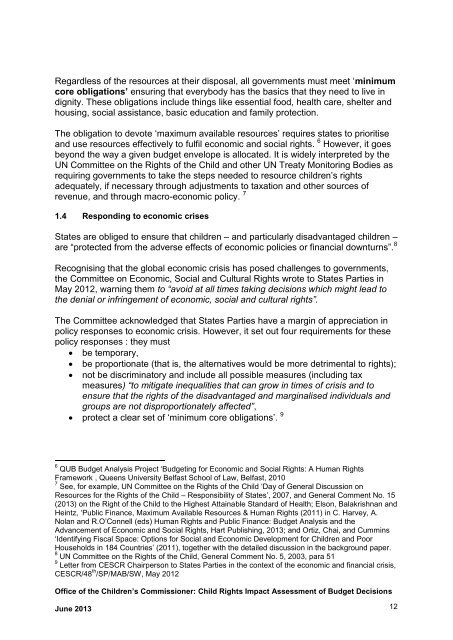force_download.php?fp=/client_assets/cp/publication/676/A_Child_Rights_Impact_Assessment_of_Budget_Decisions
force_download.php?fp=/client_assets/cp/publication/676/A_Child_Rights_Impact_Assessment_of_Budget_Decisions
force_download.php?fp=/client_assets/cp/publication/676/A_Child_Rights_Impact_Assessment_of_Budget_Decisions
You also want an ePaper? Increase the reach of your titles
YUMPU automatically turns print PDFs into web optimized ePapers that Google loves.
Regardless <strong>of</strong> the resources at their disposal, all governments must meet ‘minimum<br />
core obligations’ ensuring that everybody has the basics that they need to live in<br />
dignity. These obligations include things like essential food, health care, shelter and<br />
housing, social assistance, basic education and family protection.<br />
The obligation to devote ‘maximum available resources’ requires states to prioritise<br />
and use resources effectively to fulfil economic and social rights. 6 However, it goes<br />
beyond the way a given budget envelope is allocated. It is widely interpreted by the<br />
UN Committee on the <strong>Rights</strong> <strong>of</strong> the <strong>Child</strong> and other UN Treaty Monitoring Bodies as<br />
requiring governments to take the steps needed to resource children’s rights<br />
adequately, if necessary through adjustments to taxation and other sources <strong>of</strong><br />
revenue, and through macro-economic policy. 7<br />
1.4 Responding to economic crises<br />
States are obliged to ensure that children – and particularly disadvantaged children –<br />
are “protected from the adverse effects <strong>of</strong> economic policies or financial downturns”. 8<br />
Recognising that the global economic crisis has posed challenges to governments,<br />
the Committee on Economic, Social and Cultural <strong>Rights</strong> wrote to States Parties in<br />
May 2012, warning them to “avoid at all times taking decisions which might lead to<br />
the denial or infringement <strong>of</strong> economic, social and cultural rights”.<br />
The Committee acknowledged that States Parties have a margin <strong>of</strong> appreciation in<br />
policy responses to economic crisis. However, it set out four requirements for these<br />
policy responses : they must<br />
be temporary,<br />
be proportionate (that is, the alternatives would be more detrimental to rights);<br />
not be discriminatory and include all possible measures (including tax<br />
measures) “to mitigate inequalities that can grow in times <strong>of</strong> crisis and to<br />
ensure that the rights <strong>of</strong> the disadvantaged and marginalised individuals and<br />
groups are not disproportionately affected”,<br />
protect a clear set <strong>of</strong> ‘minimum core obligations’. 9<br />
6 QUB <strong>Budget</strong> Analysis Project ‘<strong>Budget</strong>ing for Economic and Social <strong>Rights</strong>: A Human <strong>Rights</strong><br />
Framework , Queens University Belfast School <strong>of</strong> Law, Belfast, 2010<br />
7 See, for example, UN Committee on the <strong>Rights</strong> <strong>of</strong> the <strong>Child</strong> ‘Day <strong>of</strong> General Discussion on<br />
Resources for the <strong>Rights</strong> <strong>of</strong> the <strong>Child</strong> – Responsibility <strong>of</strong> States’, 2007, and General Comment No. 15<br />
(2013) on the Right <strong>of</strong> the <strong>Child</strong> to the Highest Attainable Standard <strong>of</strong> Health; Elson, Balakrishnan and<br />
Heintz, ‘Public Finance, Maximum Available Resources & Human <strong>Rights</strong> (2011) in C. Harvey, A.<br />
Nolan and R.O’Connell (eds) Human <strong>Rights</strong> and Public Finance: <strong>Budget</strong> Analysis and the<br />
Advancement <strong>of</strong> Economic and Social <strong>Rights</strong>, Hart Publishing, 2013; and Ortiz, Chai, and Cummins<br />
‘Identifying Fiscal Space: Options for Social and Economic Development for <strong>Child</strong>ren and Poor<br />
Households in 184 Countries’ (2011), together with the detailed discussion in the background paper.<br />
8 UN Committee on the <strong>Rights</strong> <strong>of</strong> the <strong>Child</strong>, General Comment No. 5, 2003, para 51<br />
9 Letter from CESCR Chairperson to States Parties in the context <strong>of</strong> the economic and financial crisis,<br />
CESCR/48 th /SP/MAB/SW, May 2012<br />
Office <strong>of</strong> the <strong>Child</strong>ren’s Commissioner: <strong>Child</strong> <strong>Rights</strong> <strong>Impact</strong> <strong>Assessment</strong> <strong>of</strong> <strong>Budget</strong> <strong>Decisions</strong><br />
June 2013 12



